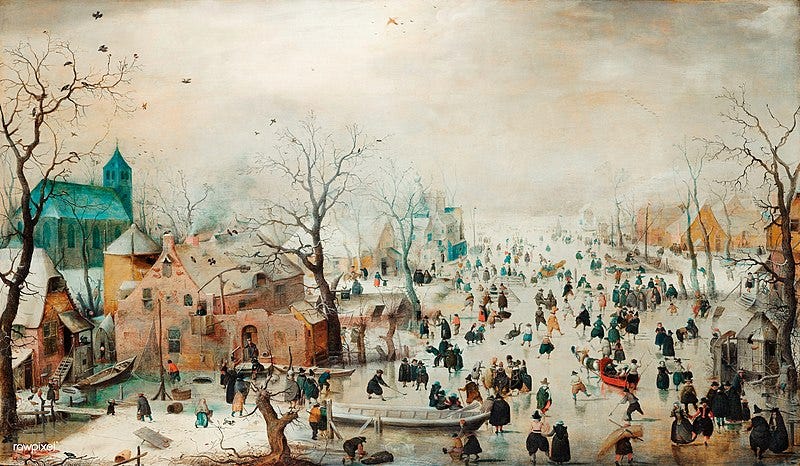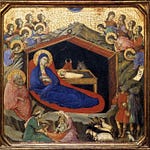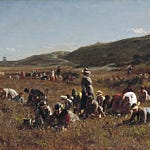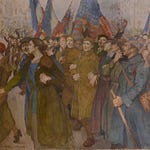“All is grace,” said the young girl Therese Martin, whom we know now from the convent where she lived and died, as Therese of Lisieux. She wasn’t just speaking of the joys of life, or of the ordinary good things that come to us every day and that we mostly take for granted: our food and drink, the air we breathe, the warmth of human affection, the company of other living creatures, the earth beneath our feet and the sky above our heads. We should thank God for those gifts, true, but le bon Dieu, as Therese always called the Father, knows also when to send us the trials that can bring us closer than ever to him.
Hence our Word of the Week, gift, is a powerful one, and a corrective to our way of thinking that we ought to get what we have deserved, and that’s it. The character for whom Shakespeare named his play The Merchant of Venice isn’t the moneylender Shylock, who is in need of correction and redemption, even as he has quite legitimate grudges against the Christians of the city where he lives and plies his business. It is the chance-taking merchant Antonio, who gives of himself and his wealth to his friend Bassanio, so that the young man may go to Belmont in style and court the lovely heiress Portia. Bassanio himself has one the amiable vices of youth, which is that he is a little too free of his means with his friends. When the merry rascal Gratiano asks him for a favor, Bassanio replies, “You have gained it!” even before he knows what it is.
Shakespeare understands that when you give, you take a chance. After all, the giver cannot enforce gratitude. That’s a contradiction in terms. And if you have to wait till the receiver of your gift is worthy of it, you may never give anything at all. If God waited till we deserved his gifts, we would be in big trouble. In fact, that’s one of the things that Portia, disguised as a boy lawyer in the great court scene near the end of the play, has to teach Shylock, and us too.
What happens when things are as Thomas Carlyle once said, that “cash payment is the sole nexus between man and man”? Let’s think this through. Suppose my good friend says, “Tony, I’m going to put new shingles on my roof, and I could use a spare hand for tarring them and getting them ready. Are you doing anything tomorrow?” If I reply, “How much are you willing to pay me?” I will lose a lot more than money can buy. I will lose my friend. Imagine his disappointment. It isn’t that he can’t afford the cost. It’s that I’ll have misconstrued him and his affection for me. It isn’t that I think that shingles grow on trees or that they prepare and apply themselves. It isn’t even that I think that friendship grows on trees. It’s that I don’t know what friendship is. I don’t feel the joy of the gift. And if I were the one who needed help with my roof, and I offered to pay him, I’d hurt him that way too. For I’d show that I was unwilling to receive a gift, maybe because I didn’t want to be called on to give in return.
But when you live in a world of gifts, what a great joy it is when the sun shines, and what great comfort when the night falls, as it must! Imagine a gang of Amish men gathering at their neighbor’s farm to raise up a barn in one day, and the women gathering to make the food and to prepare the trimmings, and the children gathering to do what they can to pitch in, or to play games in the field, and the dogs gathering to run about and bark, giving their own glad contribution to the feast. How fine a thing that must be! But it wasn’t just the Amish who used to do things like that. Why, I’d almost say that you need neighbors for it, and not just people whose addresses are geographically near yours. Or that you need the regular acknowledgment that you too have been given great gifts. Freely have we received; freely should we give.
Where does our word come from? The Anglo-Saxon verb giefan, to give, was pronounced like YEE-uh-vahn, with the g turned into a y-sound before the front-of-the-mouth vowel sound ee; so we should have yive instead of give, as we have yellow instead of gellow and yard instead of gard (but see the doublet garth, a dialect word for farm). But the Vikings kept the hard g sound, so it happened that under their influence when they settled in the northeast of England, the hard g sometimes won out over the soft y, as the hard k sometimes won out over the soft ch, and sometimes they both stuck around, so we have church / kirk; ditch / dike; shipper / skipper.
In any case, giefan came from an ancient root having to do with taking hold of something, or giving it into the hold of somebody else, so that our word give is a cousin of Latin habere, to have (and English have is not related to either one!). I like that connection. For it takes us into a place of things hidden in open sight, such as that you most have your love when you most give it to someone else. And perhaps we can say the same for liberty, too.
Word & Song is an online magazine devoted to reclaiming the good, the beautiful, and the true. We publish six essays each week, on words, classic hymn, poems, films, and popular songs, as well a weekly podcast, alternately Poetry Aloud or Anthony Esolen Speaks. To support this project, please join us as a free or paid subscriber.












